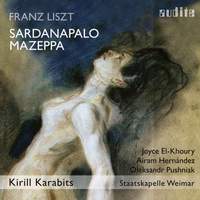Recording of the Week,
Liszt’s Dante Symphony plus a world-premiere recording from Kirill Karabits
In last year's Presto Awards, the winner in our category of "Premiere Recording (rediscovery/reconstruction)” was a revelatory performance by the Staatskapelle Weimar and Kirill Karabits of the single-completed act from Liszt’s opera, Sardanapalo. Now they return with yet another world-premiere Liszt recording. Admittedly this time the discovery is not quite as earth-shattering as an entire operatic act: here we have an eleven-minute processional piece entitled Künstlerfestzug zur Schillerfeier (Artists’ Gala Procession for the Schiller Celebrations), first performed, as its title suggests, at celebrations marking the centenary of Schiller’s birth.
 As pieces written for gala processions of artists go, I must say I found it surprisingly interesting: it opens pretty much as expected, with crashing chords and brass fanfares, but I was pleased that Karabits keeps it light enough that it never tips over into tedious pomposity. When the strings take over the brass fanfare, the Weimar players give it just the right amount of bounce to ensure that the piece never outstays its welcome. This is helped by the central section, where the march-like rhythms give way to a beautiful horn solo accompanied by harp and strings. When the horn melody is then taken up by woodwind, violins, and cellos, soaring above a gently throbbing triplet accompaniment, there's a delightful sheen to the string sound.
As pieces written for gala processions of artists go, I must say I found it surprisingly interesting: it opens pretty much as expected, with crashing chords and brass fanfares, but I was pleased that Karabits keeps it light enough that it never tips over into tedious pomposity. When the strings take over the brass fanfare, the Weimar players give it just the right amount of bounce to ensure that the piece never outstays its welcome. This is helped by the central section, where the march-like rhythms give way to a beautiful horn solo accompanied by harp and strings. When the horn melody is then taken up by woodwind, violins, and cellos, soaring above a gently throbbing triplet accompaniment, there's a delightful sheen to the string sound.
Given the provenance of the orchestra, it is appropriate that all three pieces here were written whilst Liszt was living in Weimar, and after the Künstlerfestzug we turn to the symphonic poem Tasso: Lamento e Trionfo, depicting the struggles and successes of the sixteenth-century Italian poet. In the opening Lamento, Karabits coaxes some fantastic timbres from the woodwinds, including plangent oboes and a dolorous tone from the bass clarinet during its extended solo. Soon, though, the Trionfo appears, and the Weimar brass give it their all, with majestic trumpets and biting trombones.
Another Italian poet to have inspired Liszt was Dante, who crops up in several compositions, most notably here in the form of A Symphony to Dante’s Divine Comedy, a large-scale orchestral work in two parts. It's an extraordinary piece, full of orchestral effects representing the terrors of Dante's Inferno, with the clear influence of Berlioz and the similarly grotesque sounds from the Witches' Sabbath movement of his Symphonie fantastique from thirty years earlier. Liszt leaves no stone unturned in his quest to portray the diabolical horrors that Dante describes so vividly, with ominous tam-tam strokes and bass drum rolls, snarling hand-stopped horns, and creepily chromatic tremolo strings, while towards the end he even throws in a wind machine for good effect! It's all thrillingly played, particularly the doom-laden brass interjections (at several points Liszt actually writes underneath their parts Dante's famous exhortation: "Lasciate ogni speranza, voi ch'entrate"). There is also some impressively aggressive playing from the violas in their imitation of what Liszt terms the "blasphemous mocking laughter" of tormented souls.
Eagle-eyed readers will have spotted that I described the piece as having two parts, and yet of course Dante's work consists of three (Inferno, Purgatorio, and Paradiso). Unfortunately we don't quite make it to Heavenly Paradise in Liszt's version, although we do get tantalisingly close: it ends atop Mount Purgatory in the Earthly Paradise of the Garden of Eden, where in the distance can be heard a chorus of women (Liszt specifically asks for them to be unseen) singing the text of the Magnificat, interspersed with occasional Hosannas and Hallelujahs. These closing minutes of the work are exquisitely performed: the angelic singing from the ladies of the Deutschen Nationaltheaters Weimar and the children's chorus of the Jenaer Philharmonie provides an enchanting contrast to the turbulence of the opening movement, and a satisfyingly serene coda to this dramatic, magnificently-performed work.
Staatskapelle Weimar, Knabenchor der Jenaer Philharmonie, Damen des Opernchores des Deutschen Nationaltheaters Weimar, Kirill Karabits
Available Formats: CD, MP3, FLAC
Joyce El-Khoury (Mirra), Airam Hernández (King), Oleksandr Pushniak (Beleso), Weimar Staatskapelle, Kirill Karabits
Available Formats: CD, MP3, FLAC




